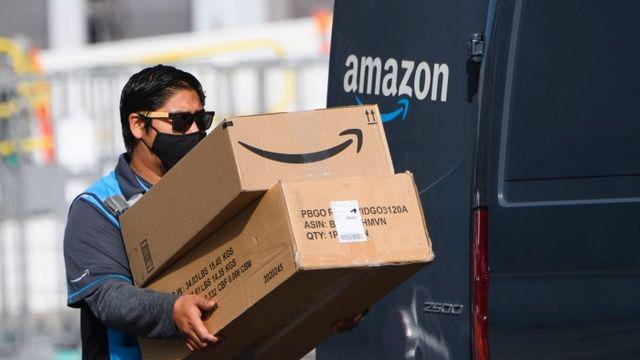Jeff Bezos has a secret weapon. It's our data.
The retail empire of Amazon is built on intricate infrastructure and a problematic work environment. And the company's success is backed by complex data about what a huge number of people are buying and browsing on Amazon's site.
Amazon has been obsessed with people's personal information since it was once a book sales specialist. About 20 years ago, the company's chief technology officer, Werner Vogels, said, "I want to collect as much information as possible" in order to offer recommended products.
And as Amazon grew, so did the business of collecting data. "Amazon just happens to sell products, it's basically a data company," a former executive at the company told the BBC in 2020.
Amazon knows a lot of personal information
Amazon knows a lot about you too. Everything you do within the Amazon ecosystem is known, from what you search for in Amazon apps and sites, to every single click, scroll, and mouse movement.
This alone can be a huge amount of information, but it's only a small part of the data that Amazon has. When a person applied to Amazon to disclose data about himself, hundreds of files were sent. It also included 10 years of purchase history and voice recorded by the voice assistant "Alexa."
"The reason why online shopping on Amazon is so convenient is that the company has strengthened its power and reachability over the years," said the human rights group Privacy International, which leverages corporate data. Sarah Nelson, director of the program, says. "Amazon is in a position to collect vast amounts of data through its retail platform. Not only that, it also collects data from many channels, including home surveillance camera Ring, voice assistant Alexa, web services, delivery services, and streaming services. I am. "
Nelson is also concerned about this, as Amazon is also entering the healthcare business.
She also seems to be displeasing regulators that Amazon has problems collecting data. The data protection authorities in Luxembourg, where the company's European headquarters are located, have been fined $ 425 million for violating the European Union's (EU) General Data Protection Regulation (GDPR) for using Amazon's personal data. ), The Wall Street Journal, dated June 10, 2020, reported.
However, the article doesn't provide details, and an Amazon spokeswoman declined to comment on the possibility of being fined. UK regulators are also keeping an eye on Amazon's use of data on suspicion of anti-competitive behavior. The UK government has also called on Amazon to disclose a lot of data, including information recorded on Ring and Alexa.
Contents of personal information collected by Amazon
First, let's take a look at Amazon's "Privacy Policy". It's not surprising that most people don't even read this convention, which has more than about 4,400 words in the UK version. But this convention clearly stipulates how to handle your data.
There are three main sources of personal information that Amazon collects. One is the information you give to Amazon when you use Amazon or its services (such as reading ebooks on your Kindle). The second is the information that Amazon automatically collects (information about your smartphone, location information, etc.), and the third is the information that Amazon obtains from a third party (credit check to determine fraudulent personal accounts). Etc.).
What is Amazon's ultimate goal in collecting data? It's about selling more products. Amazon uses all the information you can know about your likes and dislikes, not just your personal information, to present the items you might buy as "recommended items". In addition, you can see trends in the consumption behavior of Amazon's most popular sellers and people.
"Information about personal buying behavior is extremely sensitive data," points out Carissa Veliz, an associate professor of ethics at Oxford University. "Purchasing history tells us so much about a person's health, political tendencies, sexual orientation, and much more. People buy everything from books to movies to health-related products on Amazon. If you add the personal information that Alexa collects to this, the problem becomes even more serious. "
Amazon also leverages your location. The purpose is to ensure delivery of purchased products. "Amazon uses your personal information to operate, provide, develop and improve the products and services we provide to you," Amazon's Privacy Policy states. It also broadly stipulates legal claims about the data it collects.
Information you are "passing" to Amazon
Let's take a look at the information you gave to Amazon. You should assume that all your actions regarding Amazon's websites, apps, and products are stored in some way. Items ordered from Amazon, shows viewed on Amazon Prime Video, music listened to on Amazon Music, instructions to Alexa, etc. are all tracked and stored.
According to Amazon's Privacy Policy, you give Amazon the following information, depending on your personal settings: First of all, detailed information about payment such as your name and address, phone number, bank account, age, location information. In addition, the name, e-mail address, and address of the person listed in the contact book are also given. Also, photos, playlists, watchlists, wishlists, audio recordings, Wi-Fi information, credit history, etc. uploaded to your profile are out of the question. If you sell your products via Amazon, the EU also provides value-added tax (VAT) data and business information.

Even more creepy is the information that Amazon automatically collects. This includes all the data about when and how you use Amazon's services.
When freelance journalist Riccardo Corcini requested all the details he clicked on Amazon's website, he said he received a table with 12,048 rows. According to an article published by Corcini on his website in 2018, "Information on the date and time of visiting a page, the IP address and device name used, location information based on the IP address if possible, Internet connection, etc. It is said that the name of the carrier that provided it was listed.
In addition, not only the date and time of reading the ebook on the Kindle, but also the content to be copied or highlighted is recorded. In addition, the video recording of the other side of the door detected by Ring and the tapping action in the Ring app are all recorded.
Understand the status of interaction
According to Amazon's Privacy Policy, the information automatically collected includes IP address and login details, computer location, errors recorded by the device when using Amazon services, app settings, cookie details, etc. An identifier linked to your smartphone or computer, all URLs you click on (including information about your interaction with the page, such as scrolling, clicking, and mouse movements).
Collecting and recording information on user interactions is now common sense and is used to improve the quality of sites and identify bugs. However, such information is accumulated more and more. Amazon says it will not only use the data collected in this way to improve its services, but also for other purposes such as legal obligations. "Amazon does not sell personal information to third parties," the privacy policy states.
The third source of personal information that Amazon collects comes from third parties. This includes updated delivery addresses (if the shipping company discovers that there is a problem with the address you provided), accounts and purchases that come from Amazon's co-branded operators. Information, information about "interactions" with Amazon's subsidiaries (many of which have individual privacy agreements), information about devices linked to Alexa, credit history as part of efforts to detect fraud. There is.
It's impossible to stop tracking, but ...
It is impossible to completely prevent Amazon from tracking. As long as you shop at Amazon, Amazon collects your information.
However, there are several ways to limit the information that Amazon collects and uses. Some of them are provided by Amazon itself, while others can be achieved by changing the settings of the browser used or using another tool.
First of all, if you want to know what data Amazon has collected in the past, you can use Amazon's download tool. However, this is only part of the information that Amazon holds about you, and if you need all the information, you will be requesting disclosure of your personal information (called SAR in the UK).
There are several other features that Amazon has provided to protect your privacy. For example, Alexa and Ring have their own privacy settings that allow you to delete recorded audio and manage your privacy settings.
But to access most of Amazon's information, you need to use your Amazon account. This will prevent you from seeing ads that are specific to your tastes and interests, but will still show recommended products based on previously purchased items on Amazon (you can adjust them, but you can't turn them off).
For this reason, you should also consider turning off advertising cookies that allow third parties to collect personal information. There are more than 75 external Amazon partners that use cookies, from Facebook to online gaming giant King Digital Entertainment.
Can the history be deleted?
You can also "erase" your browsing history on Amazon. However, there are opinions that the effect is doubtful.
The Amazon settings page says, "Amazon allows you to keep your browsing history hidden." "If you turn off browsing history, you won't see the products you click or search on your device," he said. However, the data itself has not been deleted.
According to Veliz of Oxford University, it can be very difficult to get Amazon to delete personal data. "As you know, there's no way to delete your purchase history. There's no way to do it. You can't even delete an item that you purchased more than 10 years ago," says Veliz. "The best you can do is make your purchase history invisible to yourself. It's ridiculous, but sometimes you can't even do this."
You can hide the individual order history on the order history page. The drop-down menu shows the year you had your Amazon account.
If you want to limit Amazon tracking using something other than Amazon's own tools, you need to use a privacy-focused browser. These browsers can automatically disable third-party cookies and prevent tracking across the web.
Also, don't forget to log out of your Amazon account if you don't want it to be associated with your Amazon account when searching. When looking for or purchasing a product, you may purchase directly from the manufacturer or use another online shopping company.
And if you want to completely reject Amazon tracking, you have the ultimate choice. It's the deletion of your Amazon account.
* Click here for Amazon related articles by "WIRED".
Business
The proliferation of residential surveillance cameras in the United States records "everything" in life
Gear.
With the launch of the smart display "Echo Show 5", Amazon will shift its focus to privacy?
Business
Is consumption behavior out of the ordinary?The value of "data" that Amazon gets with the acquisition of a Wi-Fi router company
INFORMATION INFORMATION
Under recruitment of WIRED Japanese version "membership" members who can also participate in limited events!
"WIRED SZ Membership" is a member service that delivers a selection of long leads (feature articles) packed with insights for the next 10 years according to weekly themes. The exciting service, which can participate in the weekly members-only event, is running a one-week free trial!Click here for details







